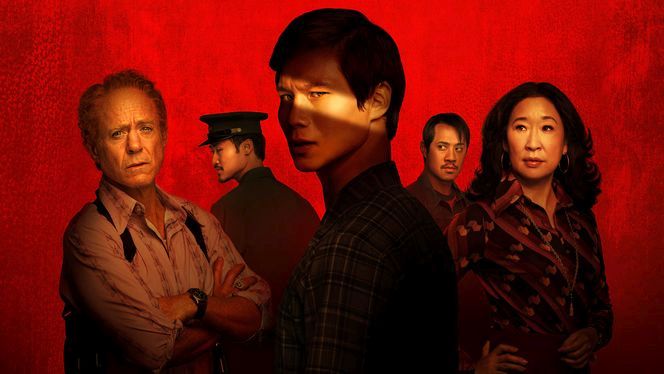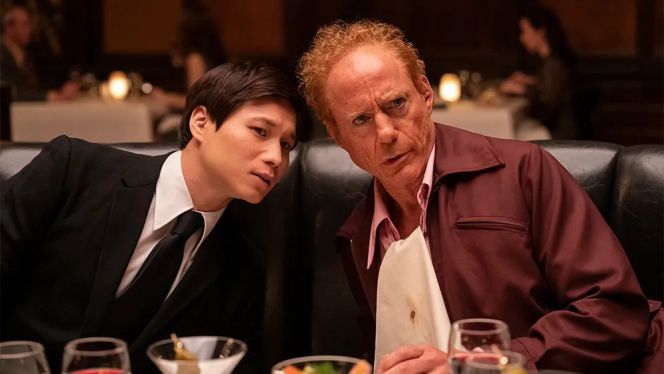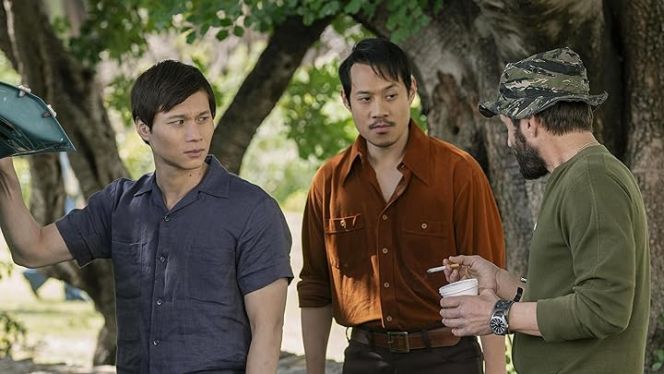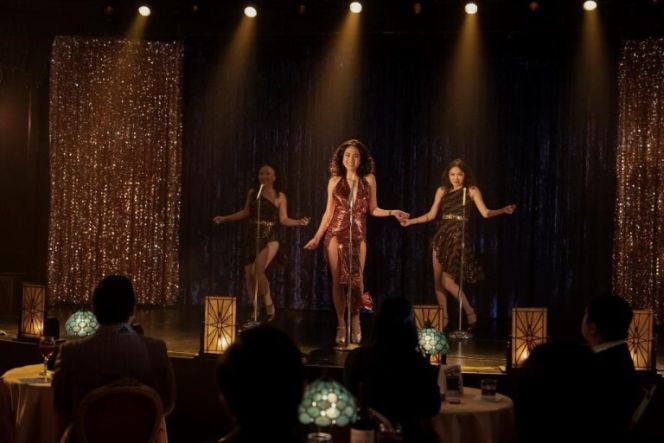SERIES REVIEW – Park Chan-wook’s stunning spy thriller invites us on a sarcastic, identity-conflicted adventure in his new darkly comedic miniseries on HBO Max, adapted from Viet Thanh Nguyen’s Pulitzer Prize-winning novel. The series follows the American exploits of a communist spy at the end of the Vietnam War, who faces unique challenges in his overseas life while encountering multiple American characters, all portrayed by Robert Downey Jr.
The story unfolds through the narration of our French-Vietnamese protagonist, known simply as the Captain. One of the more comical scenes introduces us to his “life philosophy,” which transcends simple storytelling and serves as a general ars poetica. At the university where our hero has recently started working, a reception is held for the Oriental Studies Department. Here, a professor (Robert Downey Jr., in one of his many roles in the series) dressed in a kimono introduces him to everyone as an exotic “party piece.” The Captain (Hoa Xuande) takes a brief pause to chat with the only other Asian guest, Sophia (Sandra Oh). The professor sarcastically remarks about her, criticizing her for not showing enough interest in her Japanese heritage, yet she remains gracious, offering the Captain an appetizer. Although the Captain declines, he slips in a rare moment of honesty in his explanation: “I think the world would be a better place if the word ‘murder’ embarrassed us as much as ‘masturbation,'” says the Captain.
The Spy Who Came from Vietnam
How he transitions from refusing appetizers to self-affirming arguments is best left a mystery, but it’s not the plot threads that are paramount; it’s the humorously candid revelations that matter most. The Captain rarely gets the chance to speak openly about anything, being a spy. Trained by the CIA and embedded in the South Vietnamese army for the past four years, he is a North Vietnamese communist double agent who hoped his service would end when Saigon fell. Instead, he’s sent to Los Angeles with his target, the General (Toan Le), in case the defeated military leader plans a counterattack in the relative safety of America.
Despite the diverse array of characters, the Captain’s conflicting character remains the focal point of The Sympathizer, a seven-part, ambitious, and complex miniseries that defies a single-sentence summary. This work is simultaneously an anti-war drama highlighting the moral depravity of mass killings, a re-interpretation of the Vietnam War from the historically oppressed Vietnamese perspective, a black comedy satirizing white Americans’ timid efforts towards inclusivity and empathy both on and off-screen, and a coming-of-age story of three friends whose personal loyalties are tested by political divisions.
The story is held together by the Captain’s exceptional portrayal by Xuande, as the protagonist struggles to find his identity amidst the myriad roles imposed upon him. The Sympathizer is narrated through the protagonist’s prison confessions. “Rewrite, relive, restart,” emphasizes the final line of the introductory caption, acknowledging that “every war is fought twice: first on the battlefield, second in memory.” Some secrets the Captain keeps to himself (though he shares with the viewers), while others are only recalled with the “help” of his torturers. The Captain’s insightful recollections of the fall of Saigon, the American secret mission, and his role as a cultural advisor on a big-budget Vietnam War movie provide an artistically valuable and highly entertaining episodic structure to the series.
Internal Struggles and Conflicts with Others
Each event triggers profound internal struggles within our twenty-something spy. As northern forces approach Saigon, the Captain must decide which officers can join the General on the last flight out of Vietnam. His communist commitment compels him to leave behind the smartest and most valuable southern leaders for interrogation, torture, or possible execution by the north. However, if his decisions become too detrimental to the forces he ostensibly serves, will the General not begin to suspect? What furthers his cause may cost him his life—this moral and ideological contradiction resurfaces repeatedly, in various forms, after he returns to America.
While working on a film set with an Oscar-winning, temperamental director (also played by Downey), the Captain doesn’t hesitate to defend the Vietnamese actors from harsh stereotypes. (In the initial script draft, not a single local character had any lines.) Yet, he feels powerless amidst the insensitive gears of the studio system as he serves various bosses. As filming continues, the Captain returns to a cemetery set—a haunting replica of his childhood village—where he erects a shrine in memory of his mother. Only in an artificial reality can he process his true, stubborn feelings, which become increasingly difficult as the production around him grows more grotesque.
Downey’s Multiple Disguises
Oscar-winner Downey’s portrayals are more than mere multiple roles; they are a series of chameleon-like transformations, each with a special connection to the Captain and embodying a mix of typical American arrogance, charm, and power. As the director, Downey gleefully depicts the horrors of war while enjoying its dramatic and brutal aspects. As the professor, he masks his obsession with Asian culture with scientific superiority. As the Captain’s CIA handler, Claude, he revels in manipulation, always ready to cut the strings before they entangle him. “Whoever needs to be, I am,” he tells the Captain, “just like you.”
Downey’s performance exudes a unique dark humor, powerfully conveying his characters’ distorted worldviews and strange behavior—though constantly reiterated, they are not the types of characters through whom the Captain can feel at home in a foreign land. While his characters’ moods do not always perfectly align with the series’ shifting tones, his mustached professor would feel at home on “Saturday Night Live,” while his director role reflects a more streamlined, antagonistic version of Downey often seen—a self-willed, outspoken person who gets what he wants. Choosing Downey for every American power role was a strategic decision that undoubtedly contributes to The Sympathizer’s uniquely entertaining nature, though not all of his performances ideally serve the scenes, especially compared to Xuande’s subtler, chameleon-like portrayal, who can transform from himself into anyone others want him to be at any moment.
Occasional Inconsistent Quality
The Sympathizer, co-directed by Chan-wook and Don McKellar, often delivers a sweeping experience. The time jumps, tonal shifts, and flood of incisive thoughts profoundly impact the viewer. Chan-wook’s passionate direction makes the first episode captivating, but the fourth episode, depicting the film shoot, feels like a missed opportunity. Chan-wook’s evident interest in the deception required by actors and spies and the ensuing chaos could have resulted in a sharper critique of Hollywood’s toxic behavior patterns than the flat characters presented here. However, David Duchovny’s hilariously outrageous performance as a Marlon Brando-esque, stubbornly self-willed method actor stands out, taking method acting to the extreme.
Ultimately, Xuande’s profound and nuanced performance reveals the series’ deepest thoughts on surviving amidst malfunctioning systems, the inhumanity of rigidity, and shameless self-expression. The Sympathizer, like the novel it is based on, warns us that ideologies can poison your life more toxically than anything else, especially when you are still searching for your own identity.
-Gergely Herpai (BadSector)-
The Sympathizer
Direction - 8.6
Actors - 8.4
Story - 8.2
Visuals/Music/Sounds - 8.2
Ambience - 8.4
8.4
EXCELLENT
The Sympathizer series blends the dark shades of espionage and the complex questions of cultural identity in an exciting narrative, following the protagonist, a half-Vietnamese, half-French spy, living a double life while striving to find himself and his place in the world. HBO's production captivates viewers with stunning visual style and deep human stories, pushing the boundaries of political and personal dilemmas. The Sympathizer garners both critical and audience acclaim, thanks not only to its superb performances but also to its bold handling of provocative themes.

















![[TGA 2025] Star Wars: Galactic Racer Focuses on High-Stakes Podrace Runs [VIDEO]](https://thegeek.games/wp-content/uploads/2025/12/theGeek-Star-Wars-Galactic-Racer-300x365.jpg)

Leave a Reply